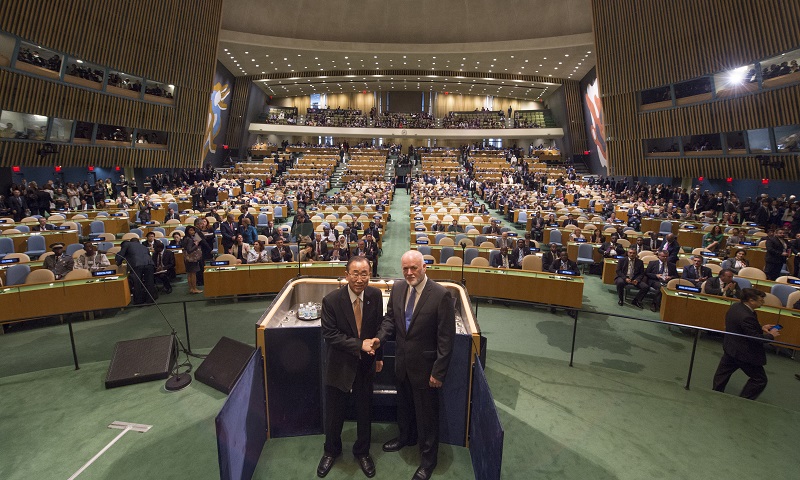
The 2030 Agenda for Sustainable Development was adopted by 193 Member States at last year’s UN General Assembly as a “manifesto for a better future,” according to Secretary General Ban Ki-moon. At the General Debate of the 71st Session of the UN General Assembly, world leaders re-affirmed their commitments to the social pillar of sustainable development, enshrined in the Sustainable Development Goals (SDGs)that were agreed upon in 2015. Heads of State and Government ministers convened for the General Debate on 20-26 September, at UN Headquarters in New York, to speak on the commitments and progress made by their countries on social development.
The Secretary General called for Member States to give civil society “greater space” as it is essential for achieving the SDGs. People power through civil society helped to make the 2030 the most inclusive development process of our time and it is the same people power that can mobilize and push leaders to take action. Peter Thomson, President of the General Assembly, reflected on the two years of intense multilateral negotiations that led to the 2030 Agenda’s adoption and called on the international community to accelerate its implementation. To support social development, “We must support greater access for poor and marginalized communities,” to sustainable and inclusive policy solutions, said Mr Thomson.
Heads of State and Government also stated their nations’ pledges for inclusive sustainable development. U.S. President Barack Obama stated that the world can reach poverty eradication, “if the SDGs are more than just words on paper,” and if advanced economies can do more to close the gap with poor nations.
South Africa President Jacob Zuma demonstrated his country’s progress in implementing the SDGs. South Africa has implemented a national development plan that aligns with the 2030 Agenda as well as the 2063 African Union Agenda, focusing on poverty eradication and uplifting the standard of living.
In Peru, President Pedro Pablo Kuzcynski spoke about his country’s incorporation of the 2030 Agenda ensuring access to water, education and health care for all Peruvians to reduce poverty. Peru’s implementation of the SDGs has also pledged a focus for indigenous peoples, to implement infrastructure and social inclusion programmes to enhance social development in Amazonian and non-urban areas.
Sri Lankan President Maithripala Sirisena declared 2017 the Year of Poverty Alleviation in his country. This declaration comes after the experience of a brutal civil war and long reconciliation process. Social development policies, coupled with “green economy” policies, will enable Sri Lanka to reach its SDG targets. “We move ahead with diligence, but I need your help to achieve this goal,” he said, urging international support.
Premier of the State Council of China, Li Keqiang, noted that China was among the first countries to submit a national implementation plan for the 2030 Agenda. However, development is unsustainable if unbalanced. The SDGs cannot be reached if economic development widened the gap between the Global North and South, led to irresponsible consumption and pollution, and if progress is not well coordinated. Social development must be inclusive and interconnected.
Polish President Andrzej Duda called on Member States to maintain a development model based on solidarity that creates equal opportunities for all and eliminates social exclusion. “We want solutions which actively involve all social groups in the development process,” he stated in his General Debate remarks.
The General Debate of the 71st Session featured statements made by leaders from most UN Member States and the European Union. Translations of the statements as well as multimedia coverage of the debate are available online.
Learn more about our work on social development at social.un.org
Source & Copyright: UNDESA DSPD, UN General Assembly
 Welcome to the United Nations
Welcome to the United Nations